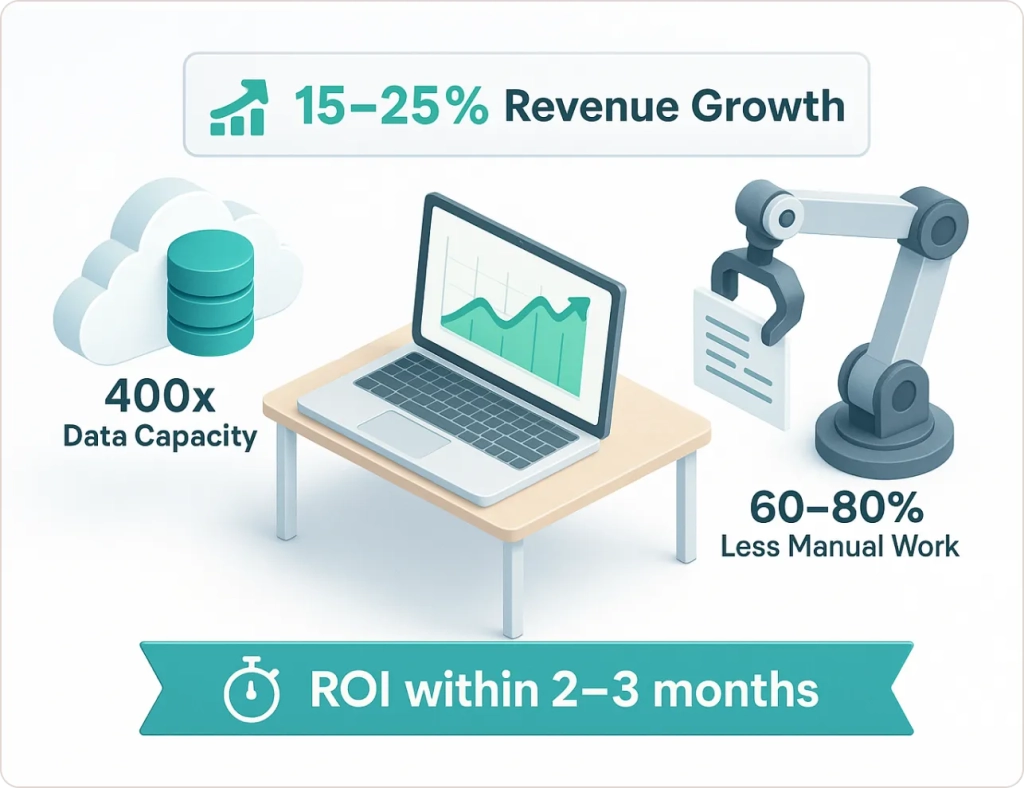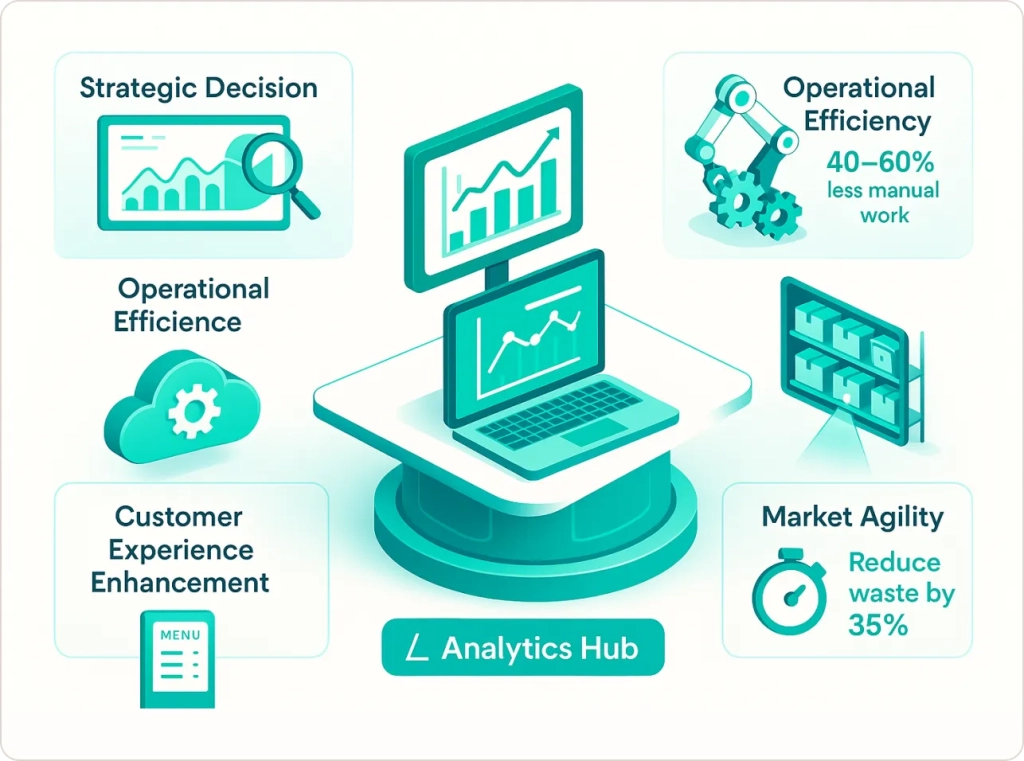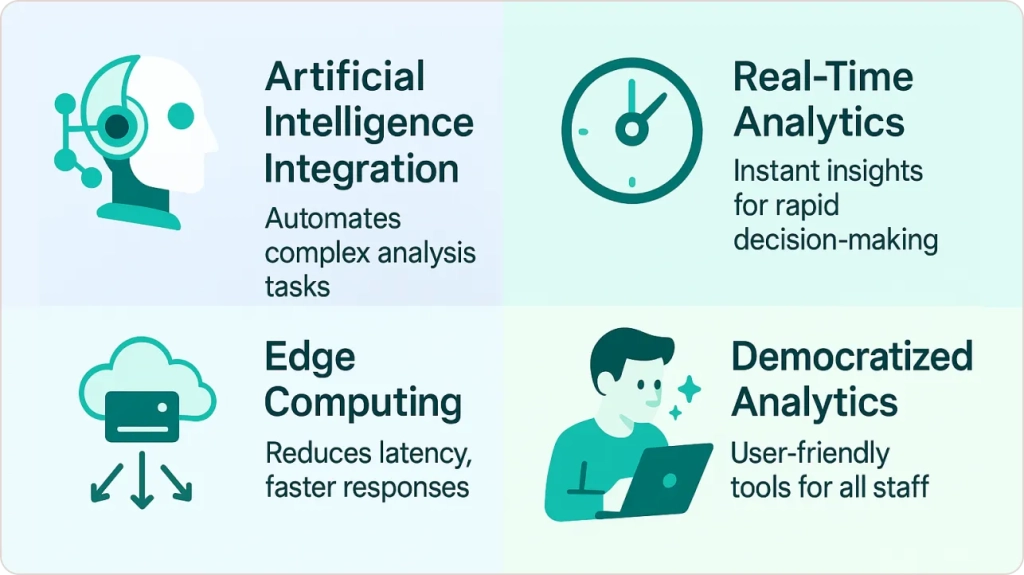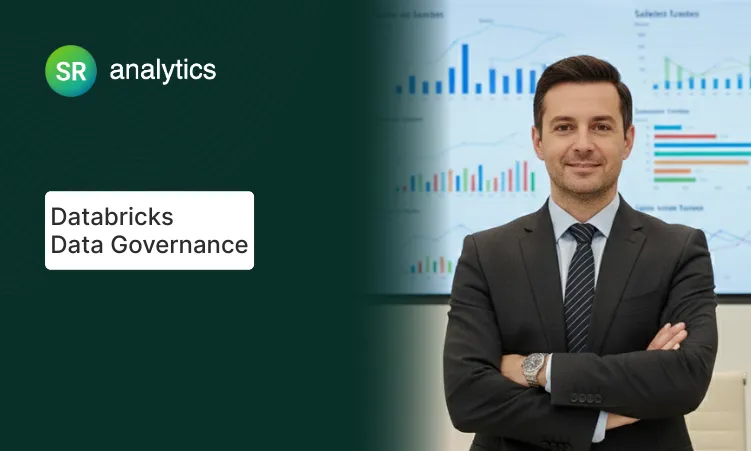Highlights
- Data and analytics services transform raw business data into actionable insights, delivering 15-25% revenue growth opportunities
- Professional analytics services reduce manual reporting time by 60-80% while improving decision accuracy
- Big data analytics services handle datasets 400x larger than Excel while providing real-time business intelligence
- Expert data consulting services identify cost reduction opportunities averaging 25-35% across operations
- Strategic data & analytics consulting enables predictive modeling that forecasts trends before competitors
- Industry-specific consulting services for business deliver customized solutions for healthcare, finance, retail, and manufacturing
Are you drowning in data but starving for insights? You’re not alone. While businesses generate 2.5 quintillion bytes of data daily—from customer interactions to IoT sensor readings—most struggle to transform this information goldmine into strategic advantages.
The harsh reality? Without proper expertise, your data remains noise, not an asset. This is precisely where data and analytics services become your competitive lifeline, turning overwhelming information into profitable insights that drive real business growth.

Quick Answer:
Data analytics consulting services help businesses transform raw data into strategic insights, enabling 15-25% revenue growth through predictive modeling, automated reporting, and data-driven decision making. Professional consultants reduce manual work by 60-80%, handle datasets 400x larger than spreadsheets, and deliver ROI within 2-3 months through optimized operations and competitive intelligence.
What Are Data Analytics Consulting Services?
Think of Data Analytics Consulting Services as your business intelligence translators. These specialized analytics services help organizations unlock the hidden value in their data through:
- Data Collection & Integration: Gathering information from multiple sources (sales figures, customer feedback, website analytics, IoT sensors)
- Data Cleaning & Processing: Transforming messy, fragmented data into clean, actionable datasets
- Pattern Recognition: Identifying crucial trends like “Why do weekend sales consistently drop 30%?”
Strategic Recommendations: Converting insights into specific actions such as “Implement targeted weekend promotions to recover lost revenue”
Why Smart Companies Invest in Data Consulting Services
Forward-thinking organizations leverage big data analytics services for several compelling reasons:
1. Accelerated Problem Resolution
Instead of spending weeks diagnosing production bottlenecks or customer churn, data & analytics services pinpoint issues within days, sometimes hours.
2. Evidence-Based Decision Making
Replace costly guesswork with data-driven strategies. Companies using analytics-based decisions are 6x more likely to be profitable year-over-year.
3. Revenue Optimization
Data & analytics consulting typically identifies 15-25% revenue growth opportunities that internal teams miss due to data silos or analysis limitations.
4. Cost Reduction
Automated analytics processes can reduce operational expenses by up to 30% while improving accuracy and speed.
Core Services Provided by Data Analytics Consultants
Professional consulting services for business typically include:
- Data Strategy Development: Aligning your analytics initiatives with business objectives and ROI expectations
- Predictive Analytics & Machine Learning: Leveraging AI-driven models to forecast trends, customer behavior, and market shifts
- Advanced Data Visualization: Creating intuitive dashboards that transform complex datasets into actionable insights through proven visualization best practices
- System Integration: Seamlessly connecting AI, IoT, cloud platforms, and existing business tools like Power BI for comprehensive reporting
- Industry-Specific Solutions: Customized approaches for retail optimization, healthcare analytics, financial risk assessment, and manufacturing efficiency
Industries from e-commerce to healthcare rely on these specialized analytics services to solve complex challenges like supply chain optimization, patient outcome prediction, and fraud detection.
The Business Transformation Power of Data Analytics
Data and analytics services represent far more than number crunching—they’re catalysts for organizational transformation.
Modern businesses must embrace data-driven decision making to remain competitive. Companies that resist this shift risk falling behind competitors who leverage analytics for strategic advantages.
According to research on the essential role of data analytics consultants, businesses that implement analytics-driven strategies are 23x more likely to outperform competitors in customer acquisition and 3x more likely to see significant improvements in decision-making processes.
How Data Analytics Drives Real Business Transformation:
- Strategic Decision Making: Replace assumptions with factual conclusions using descriptive, diagnostic, and predictive analytics methodologies
- Operational Efficiency: Automate routine processes and optimize workflows, typically reducing manual tasks by 40-60%
- Customer Experience Enhancement: Personalize interactions based on behavioral data (example: a restaurant chain adjusting menus based on local demographic preferences)
Market Agility: Respond rapidly to industry changes, like retailers using predictive inventory management to reduce waste by 35%

Quantifiable Benefits of Data Analytics Implementation
The impact of professional data consulting services extends across every business function:
- Marketing Performance: Hyper-targeted campaigns increase conversion rates by 20-40%, as demonstrated in our analysis of data analytics impact on digital marketing
- Supply Chain Optimization: Predictive analytics reduces inventory costs by 25-35%
- Customer Service Excellence: AI-powered analytics enable chatbots to resolve 70% of inquiries instantly
- Risk Management: Advanced algorithms detect fraudulent activities 5x faster than traditional methods
- Sales Forecasting: Machine learning models improve prediction accuracy by 15-30%
For businesses transitioning from spreadsheet-based reporting, our Excel to Power BI migration guide demonstrates how companies achieve 80% time savings while handling datasets 400x larger than Excel’s limitations.
Why Companies Struggle Without Professional Data Analytics Support
Most organizations face these critical challenges when attempting in-house data & analytics services:
1. Data Silos Create Blind Spots
Information trapped in different departments prevents comprehensive analysis. Professional consultants excel at integrating disparate data sources for holistic business intelligence.
2. Skills Gap Crisis
The demand for qualified data professionals exceeds supply by 300%. Data & analytics consulting provides immediate access to expert knowledge without lengthy recruitment and training processes.
3. Technology Complexity
With new analytics tools launching monthly, maintaining competitive technology stacks becomes overwhelming. Experienced consultants guide tool selection and implementation strategies.
4. Resource Allocation
Building internal analytics capabilities requires significant infrastructure investment. Consulting services for business offer scalable solutions that grow with your organization.
Selecting the Right Data Analytics Consulting Partner
When evaluating data and analytics services providers, prioritize these criteria:
- Industry Expertise: Choose consultants with deep experience in your sector. Healthcare analytics differs significantly from retail optimization—domain knowledge matters.
- Proven Results: Review case studies, client testimonials, and verifiable outcomes. Request specific metrics and ROI examples.
- Scalability: Ensure solutions can evolve with your business growth. Avoid consultants offering rigid, one-size-fits-all approaches.
- Methodology Transparency: Quality analytics services providers explain their processes, tools, and expected timelines clearly.
Long-term Partnership Approach: The best consultants focus on knowledge transfer and capability building, not just project completion.
Real-World Success Stories in Data Analytics
Amazon’s Use of Data Analytics for Business Success
Amazon, the largest e-commerce site in the world, applies data analysis in two major ways:
- Dynamic Pricing: Amazon sets prices on its products up to 2.5 million times every day based on consumer shopping behaviors, competitors’ prices, and product popularity. This real-time pricing allows Amazon to maximize revenues and remain competitive in the market.
- Product Recommendations: Amazon uses customer browsing and purchase history data to recommend personalized products. Amazon’s recommendation engine, which is responsible for 35% of Amazon’s annual sales, enables conversion by suggesting relevant products based on customer behavior.
Zara’s Use of Data Analytics in Supply Chain Management
For its more than 2,000 stores worldwide, one of the biggest fast-fashion retailers, Zara, has come to rely on sophisticated data analysis to control its inventory in real-time. Zara takes this further by analyzing daily sales data to identify trends and align its production plans. By cutting lead times from the point of design to getting the product into stores, they can respond quickly to customer demands. This presents Zara with an advantage in the fast-fashion market.
Manufacturing Excellence: A mid-size automotive parts manufacturer partnered with data analytics consulting services to optimize production efficiency. Result: 23% reduction in waste, 18% improvement in output quality, and $1.2M annual savings.
Retail Transformation: An e-commerce company leveraged big data analytics services to personalize customer experiences. Outcome: 31% increase in average order value and 28% improvement in customer retention rates.
Healthcare Innovation: A regional hospital system implemented predictive analytics for patient care optimization. Achievement: 19% reduction in readmission rates and 15% improvement in patient satisfaction scores.
Industry Expert Insight
“Without big data analytics, companies are blind and deaf, wandering out onto the web like deer on a freeway,” warns Geoffrey Moore, highlighting the critical importance of professional analytics guidance in today’s data-driven marketplace.
Emerging Trends Shaping Data Analytics Services
The future of data & analytics consulting includes several exciting developments:
- Artificial Intelligence Integration: Machine learning algorithms will automate more complex analysis tasks, delivering insights faster and more accurately
- Real-Time Analytics: Businesses increasingly demand immediate insights for rapid decision-making, especially for crisis management and opportunity identification
- Edge Computing: Analytics processing closer to data sources will reduce latency and improve response times
- Democratized Analytics: User-friendly tools will enable non-technical staff to perform sophisticated analysis independently

Conclusion: Transform Your Business with Expert Data Analytics
The evidence is clear: data and analytics services aren’t just a competitive advantage—they’re essential for business survival in 2025. Organizations that embrace professional analytics consulting gain:
- Immediate Impact: 60-80% reduction in manual reporting tasks and faster problem resolution
- Strategic Advantages: Predictive insights that identify opportunities before competitors
- Measurable ROI: Most businesses achieve positive returns within 2-3 months of implementation
- Operational Excellence: Cost reductions averaging 25-35% across key business functions
- Future-Ready Infrastructure: Scalable solutions that grow with your business needs
The companies leading tomorrow’s markets are making these investments today. Every day you delay means missed opportunities, inefficient operations, and competitors gaining ground with superior data intelligence.
Your transformation begins with a single decision: continue struggling with data chaos, or partner with experts who turn information into your most valuable business asset.














